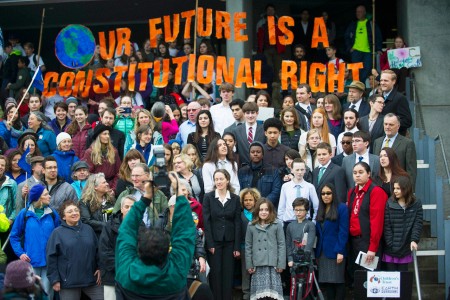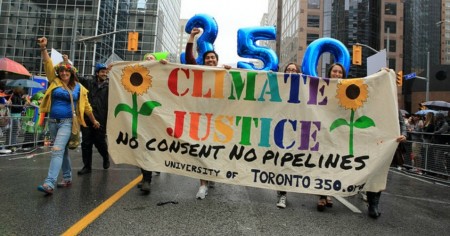June 22, 2016 – To stop dangerous climate change humanity needs to use all the instruments in its possession. One of them is the law. As Justice Donald Rennie ruled against a Canadian oil company in a decision a couple of weeks ago he stated, “Protection of the environment is, unequivocally, a legitimate use of the criminal law purpose.” He further stated, “The environment and economy are intimately connected, indeed, it is practically impossible to disassociate the two.” Where Justice Rennie was ruling on the right of Canada’s federal government to set the content of diesel fuel to include a component of biodiesel, another case in the Philippines puts into perspective the way the law can act as an instrument to drive action on climate change.
In the case of the Philippines the case being brought to court is aimed at international fossil fuel companies seeking redress for violating human rights by inflicting climate change on the planet. The suit seeks damages for financial losses and deaths from extreme weather such as Typhoon Haiyan that killed more than 6,000 people in 2013 and caused $13 billion U.S. in damages. The companies named include Chevron, ExxonMobil, BP, Royal Dutch Shell and ConocoPhilips.
What’s at stake in a world facing rising levels of carbon dioxide, methane and other greenhouse gases in the atmosphere is can the courts provide climate justice? Are those contributing to atmospheric warming accountable? Can courts of law rule against companies that fail to address climate change in their past, present and future operations? Can increased frequency of extreme weather events serve as the smoking gun leading to victims getting redress for pain and loss?
The case in the Philippines is not unique. Citizens around the world are beginning to litigate against the fossil fuel industry taking legal precedent from the history of action against Big Tobacco. The cases are targeting the Carbon Majors – the producers of coal, oil and gas. These companies have enjoyed the protection of governments. These companies continue to receive subsidies to help them mine, drill and extract carbon resources, and add to the carbon emissions in the atmosphere. The Carbon Majors are responsible for two-thirds of all human carbon emissions and continue to ignore the implications of their actions. ExxonMobil is currently being investigated for conspiracy to hide the evidence of their own scientists and engineers on climate change. ExxonMobil and the other Carbon Majors continue to make hundreds of billions of dollars producing the pollution that is impacting the collective common, our atmosphere, oceans and the biosphere.
Governments have been complicit in contributing to this crisis. But after COP21 no more. And now the law courts are getting into the act. In addition to the case in Canada and the Philippines we are seeing:
- a Peruvian farmer seeking climate change in a German court for damages for his farm and local hometown because of disappearing Andes glaciers.
- a Dutch court ruling in favor of 900 citizens suing the government for not doing enough to address climate change.
- 17 state governments in the United States investigating fossil fuel companies for lying to investors and the public about climate change.
- a Pakistan judge ruling against his government’s inaction on climate change as an offense against the fundamental rights of its citizens.
- a challenge by Our Children’s Trust in the United States seeking mandatory carbon dioxide emission reduction legislation in the states of Washington and New Mexico.
- Tuvalu, a Pacific island nation launching a case in New Zealand to seek immigration permits and compensation to cover the costs of relocation in the face of rising sea levels.
In a new report entitled Climate Justice: The international momentum towards climate litigation, authors Keely Boom, Julie-Anne Richards and Stephen Leonard describe the growing number of actions in the courts of many nations by plaintiffs against defendants seeking legal redress. The ultimate aim is clear, to make any action that is harmful to the environment held in common, by any actor whether government, corporation or individual, be subject to litigation and the full measure of the law.
In the report’s recommendations it states that governments should act as follows:
- Remove the fossil fuel industry from the climate negotiations process and ban the industry from having a role or voice in setting climate change policy.
-
Acknowledge and discharge governments’ affirmative sovereign obligations to preserve essential natural resources, including a healthy atmosphere, ocean and climate system, in accordance with best available science, for the benefit of all present and future generations, with comprehensive plans for emissionreductions and reforestation/carbon sequestration.
-
As well as making appropriate contributions in their own right (public climate finance), introduce a levy on fossil fuel producers to partly fund the International Mechanism for Loss and Damage, allowing for individuals and communities to directly access the funds made available through this process.
-
Remove fossil fuel subsidies and couple this action with carbon levy to ensure that governments recuperate the true and complete costs of climate change from industry.
-
Introduce into international climate law a provision that recognizes the role of private sector liability and encourages governments to take legislative action and legal actions under existing laws to deal with criminal and civil liability of the fossil fuel industry.
-
Take legal action against the fossil fuel industry within national jurisdictions to establish liability, recuperate the costs of climate change and expose internal industry documents.
-
Consider amending limitation periods if necessary to allow claimants to bring cases from the time that climate damages manifest.
-
Implement strategies to ensure fossil fuel defendants do not take action to avoid liability (e.g. through shifting assets to alternative jurisdictions or splitting up their companies).
-
Introduce legislation that specifically addresses climate liability if there is a need for clarification of the law or a need to change the law to make climate litigation feasible.










